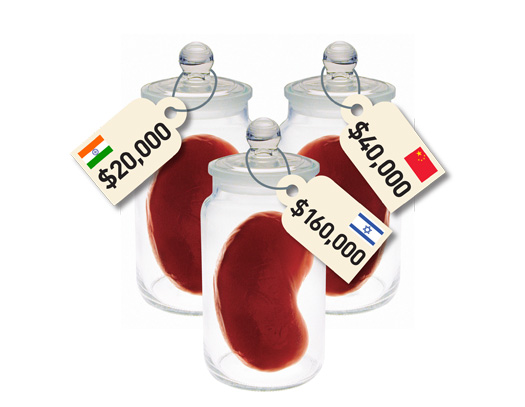


Social media sites like Facebook are known for connecting people around the world as never before. They are also facilitating a somewhat illegal practice of buying and selling organs, according to an investigation from Al Jazeera.
Though presumably all sorts of organs are available on the black market, kidneys are the most in demand. Of the approximately 122,000 people on the U.S. transplant list, about 101,000 of them—more than 80 percent—are waiting for kidneys. But because there aren’t enough organs to go around, only 10 percent of those people will receive the transplants they need. Those patients with means can find other ways to get the life-saving kidneys, often in one of 91 countries abroad with the help of a transplant broker. And although many of these countries don’t allow people of different nationalities to give or receive organs for transplantation, it’s hard for countries to enforce these regulations.
The international organ trade isn’t new. What’s new is social media’s role in this black market, especially in Southeast Asia. According to the Al Jazeera story, brokers based in India or Sri Lanka create fake Facebook profiles (often young women, who are perceived as more trustworthy) and post messages on kidney transplant support groups saying that they are desperately seeking a transplant for a relative. The brokers change their cell phone numbers and account information every five to six weeks so that they can’t be tracked.
Similar stories have surfaced in the past few years. In 2014, a reporter for Britain’s Sunday Post posted an ad asking for kidneys in a Facebook group for that purpose and received nearly a dozen responses. But other news outlets have pointed out the upside of social media for those who need an organ: They allow them to broadcast the need to their personal networks, and maybe even find a donor who they know personally, eliminating their need to revert to the black market. And there’s no question that the black market is still a scary place–mix with the wrong crowd and there’s no telling who can be kidnapped and drugged, only to wake up and find a surgical scar and a missing organ. Although the Chennai-based broker that was the focus of the Al Jazeera story would probably make more money in Sri Lanka, he said that he didn’t trust his colleagues there, citing concerns that they would take out his kidney, too.
In these instances of organ donation facilitated by social media, both legal and illegal, Facebook has been the most commonly used social media outlet because because it is so global and because the groups feature provides a strong concentration of people with something in common—a geographical location, a cause, or an interest. And though the Al Jazeera article focused on the trade in Southeast Asia because that’s where it’s growing fastest, it’s no stretch to think similar transactions for kidneys and all sorts of other organs are going on all over the world.
